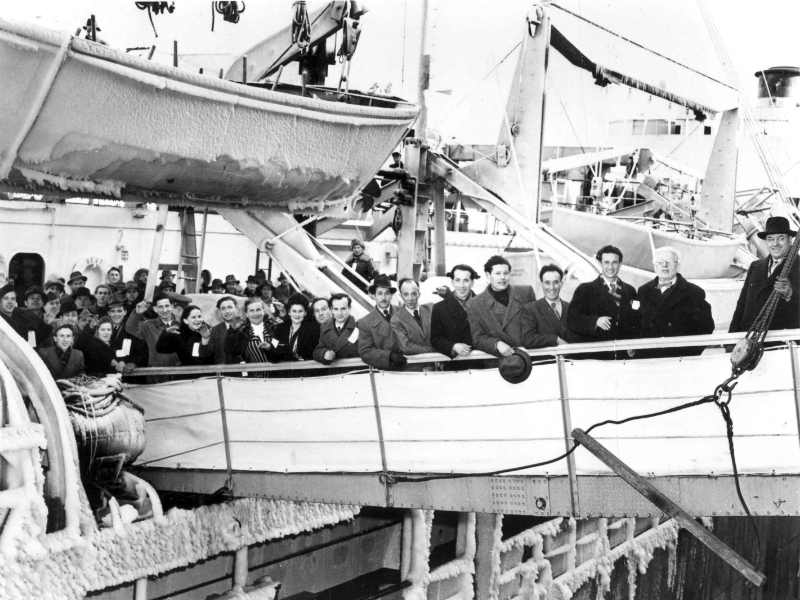Two and a half years after the Second World War ended, businessman Sam Posluns addressed the Toronto Cloak Manufacturers’ Association. Posluns, one of four men who visited the war-torn Europe in the company of Max Enkin, a representative of the men’s clothing industry in Toronto, was making a pitch to his colleagues in the needle trades to open their businesses to displaced persons (DPs) who were still languishing in refugee camps in Europe.
The Jews in Europe who had survived the Holocaust were in need of jobs and homes, he said, but also compassion, human warmth and patience.
“Not only is housing needed, but the need for love and warmth and friendship, which must be forthcoming from us, is needed as badly as the accommodations themselves,” he said.
In the end, the Tailor Project managed to bring 2,000 refugees from Europe to work in the rapidly growing needle trades, mostly in Toronto, Montreal and Winnipeg. Half of them were Jews, plucked from DP camps throughout Europe.
On May 1 – timed to coincide with Yom ha-Shoah, Holocaust Remembrance Day – survivors who came to Canada as part of the Tailor Project, along with their families and members of the community, will gather at the Holy Blossom Temple in Toronto to attend an event called “Common Thread.”
The event “provides a powerful forum to hear, in some cases for the first time, the stories of perseverance, survival, unimaginable strength to overcome adversity and inspiring new lives in Canada from Jewish Holocaust survivors and their children,” states a media release publicizing the gathering.
READ: MORE THAN HALF OF CANADIANS DON’T KNOW SIX MILLION JEWS DIED IN HOLOCAUST: POLL
Larry Enkin, whose late father Max was the driving force behind the Tailor Project, estimates that as many as 500 people who are related to the immigrant tailors will attend, along with hundreds of members of the community, as well as representatives of the federal government.
Enkin will address the gathering, along with Rabbi Yael Splansky of Holy Blossom Temple.
In his speech nearly 70 years ago, Posluns commended Enkin for spearheading the project.
“It is not an exaggeration when I tell you that it is doubtful that this project would have ever been brought to this point without his leadership,” Posluns, who operated several women’s garment businesses, said at the time.
Today, Larry Enkin is following up his father’s efforts and trying to bring this little-known aspect of Canadian Jewish history to light.
About a year ago, Enkin contacted The CJN about the story, saying he wanted to make contact with as many of the tailors and their families as he could.
“When I started, I had no idea what type of reception I would get,” he said.
In retrospect, it seems there are good reasons for the widespread interest in the gathering.
“I think it’s timely,” Enkin said. “It’s a period in history where once again immigration has reared its head. The number of people searching for a home now is so extreme. And anti-Semitism is on the rise.”
Susan Posluns Lapell, Sam Posluns’ daughter, doesn’t remember much of her father’s involvement in the Tailor Project. She was just a little girl at the time and she and her brothers regret that they didn’t learn more about it. In recent years, however, their curiosity has increased and she has ventured to the Ontario Jewish Archives to find out more. That’s where she located her father’s speech, which she provided to The CJN.
It’s a little-known part of Canadian Jewish history, she said. “I think we don’t hear much about people bringing over people to this country. Immigration is a contentious issue today – who do you let in and why do you let them in? I think it’s fascinating. There might be lessons today from what happened then. I think there’s lots of negative sentiment about refugees and immigrants. None of this is new.”
Interestingly, her late father noticed the disparate way that Jewish refugees were looked at by Canadian agencies operating in Europe, and he commented about it in his speech to the manufacturers:
“There were a number of other projects of other countries, as well as Canada, going on at the same time that we were there, and while there was no talk of discrimination, they found it very convenient to eliminate the Jews from these schemes. Therefore, you can well imagine what this project meant to our people who still languish in the DP camps, the lift that it has given them and a new hope that must come from the realization that after all this time, they still have not been forgotten.”
